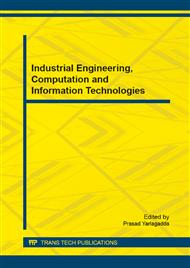[1]
C. M. Chen, S. T. Lin: Assessing effects of information architecture of digital libraries on supporting E-learning: A case study on the Digital Library of Nature & Culture, Computers & Education, Vol. 75 (2014), pp.92-102.
DOI: 10.1016/j.compedu.2014.02.006
Google Scholar
[2]
S. Erhel, E. Jamet: Digital game-based learning: Impact of instructions and feedback on motivation and learning effectiveness, Computers & Education, Vol. 67 (2013), pp.156-167.
DOI: 10.1016/j.compedu.2013.02.019
Google Scholar
[3]
A. Jones, C. Blake, C. Davies, E. Scanlon: Digital maps for learning: A review and prospects, Computers & Education, Vol. 43 (2004), pp.91-107.
DOI: 10.1016/j.compedu.2003.12.007
Google Scholar
[4]
Y. C. Chen: An empirical examination of factors affecting college students' proactive stickiness with a web-based English learning environment, Computers in Human Behavior, Vol. 31 (2014), pp.159-171.
DOI: 10.1016/j.chb.2013.10.040
Google Scholar
[5]
C. M. Chen, F. Y. Chen: Enhancing digital reading performance with a collaborative reading annotation system, Computers & Education, Vol. 77 (2014), pp.67-81.
DOI: 10.1016/j.compedu.2014.04.010
Google Scholar
[6]
S. Schnall, C. Hedge, R. Weaver: The Immersive Virtual Environment of the digital fulldome: Considerations of relevant psychological processes, International Journal of Human-Computer Studies, Vol. 70 (2012), pp.561-575.
DOI: 10.1016/j.ijhcs.2012.04.001
Google Scholar
[7]
S. H. Jin: Visual design guidelines for improving learning from dynamic and interacttive digital text, Computers & Education, Vol. 63 (2013), pp.248-258.
DOI: 10.1016/j.compedu.2012.12.010
Google Scholar
[8]
B. Cheng, M. Wang, N. Mercer: Effects of role assignment in concept mapping mediated small group learning, The Internet and Higher Education, Vol. 23 (2014), pp.27-38.
DOI: 10.1016/j.iheduc.2014.06.001
Google Scholar


